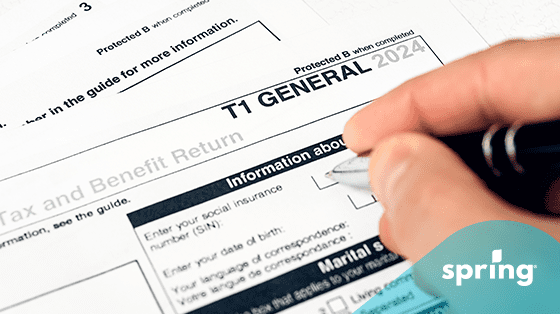In Canada, credit scores range from 300 to 900, with 300 being the lowest and 900 being the highest. Each credit score falls into a category, and which category you fall into will help determine what you qualify for in regard to financial products. Let’s take a look and see how your credit score compares.
How Credit Scores Work in Canada
In Canada, your credit score is based on a variety of different factors that are included in your credit report. The factors used to calculate credit scores are:
- How long you’ve had credit
- How long each product has been on your credit report
- Any balances on your credit cards (your credit utilization ratios)
- Any missed payments
- The amount of your outstanding debts
- Close to or maxing out your credit limit
- How many credit applications you have
- The types of credit you are using
- Any collection debts
- Public Records, including consumer proposals
- Any insolvency or bankruptcies
When it comes to your credit score, it’s also important to note that there are two main credit bureaus in Canada. These credit bureaus are Equifax and Transunion. Depending on where your credit is reported by your financial institutions for each credit line, your credit scores may be different with each credit bureau.
Credit Score Categories
Credit Scores in Canada are broken down into different categories. These categories are:
| Category | Credit Score Range |
| Poor Credit Score | 300 – 559 |
| Fair Credit Score | 560 – 659 |
| Good Credit Score | 660 – 724 |
| Very Good Credit Score | 725 – 759 |
| Excellent Credit Score | 760 – 900 |
When you’re looking to get credit products in Canada, you ideally want to have a credit score of 660 or higher. However, it’s important to remember that there are a few different credit scoring models out there, and this is only one of them. That said, most scoring models are very similar.
You may notice that the Equifax Canada and Transunion credit score models each vary slightly as well. In general, if you want to have a good credit score, you should aim for a credit score of at least 700 or higher. If you don’t already have it there, then that’s a good goal to build credit for both Equifax and TransUnion credit scores.
Average Canadian Credit Score
While all Canadians have different credit scores, there is an average credit score for Canadians. The average credit score is 680, which means the Canadian average has a credit score that is considered to be good, meaning that they have good financial health. That said, this average does change when you break it down by province or territory instead of the average of Canadians as a whole.
Average Credit Score Based on Province
There are a lot of different factors that go into the average credit score. One of the largest is where you live. Let’s take a look at the different averages throughout Canada.
| Province/Territory | Major Cities | Average Credit Score |
| British Columbia | Vancouver | 705 |
| British Columbia | Victoria | 694 |
| Alberta | Calgary | 667 |
| Alberta | Edmonton | 649 |
| Saskatchewan | Regina | 659 |
| Saskatchewan | Saskatoon | 656 |
| New Brunswick | Fredericton | 658 |
| New Brunswick | Moncton | 640 |
| Ontario | Markham | 720 |
| Ontario | Toronto | 696 |
| Ontario | Ottawa | 698 |
| Ontario | Hamilton | 660 |
| Nova Scotia | Halifax | 664 |
| Quebec | Laval | 679 |
| Quebec | Montreal | 687 |
| Manitoba | Winnipeg | 661 |
Province With The Highest Credit Scores
As we can see from the table above, credit scores in Canada vary greatly by province. Surprisingly, British Columbia actually has the highest average credit scores in Canada.
However, this may have a lot to do with the fact that the cost of living in BC is one of the highest in Canada, so more people here are borrowing money in order to get the most out of their life. Having more credit accounts and managing them properly can be a possible reason for higher-than-average credit scores.
Province With The Lowest Credit Scores
When it comes to the provinces in Canada with the lowest credit scores, an interesting fact is that some of the most affordable provinces in Canada have the lowest credit scores. These provinces are Alberta and New Brunswick. While this may be hard to believe, this likely has to do with people in these provinces having to borrow less money than those in other provinces in Canada.
Reasons to Have A Good Credit Score
There are many reasons in Canada that you may want to have a good credit score. It doesn’t just affect getting loans, either. Your credit score can affect all your bills as well as your housing. It can even affect getting a job in some cases. Let’s take a look at how it affects all of these things.
Bills
For something even as simple as a phone bill, the company is going to want to run your credit score. This makes sense because most phone plans include the cost of the phone. That said, they will often let you get a phone plan with a lower credit score because they can cut off your plan if you don’t make your payments.
Your phone company isn’t the only company that is going to run your credit score, either.
Cable companies, electric companies and even gas companies will run your credit before setting up your account. If you don’t pass the credit check for these companies, they may require a deposit in order to set up your account. This is because they don’t see you demonstrating healthy financial habits.
Housing
Whether you’re renting or purchasing a home, your credit score can make a big difference in your approval. Due to the fact that the rental market in Canada is so competitive right now, many landlords are running credit score checks on potential renters. If you have a good credit history and are known for paying your bills on time (good payment history), you’re more likely to be picked by the landlord. This is why they look for higher credit scores.
When it comes to purchasing a home in Canada, if you have a high credit score, then you are more likely to get approved for a mortgage. If you’re a first-time home buyer using CMHC insurance, you have to have a minimum credit score of at least 600 (formerly 680) . If you aren’t using CMHC insurance, lenders still want you to have a credit score of 600-620 or higher. The higher the credit score, the lower your rate will be. That said, they also have to consider your household debt, so a higher credit score isn’t always guaranteed. A low credit score doesn’t mean you can’t get a mortgage, either, though.
Employment
Many people may not be aware of this, but lots of employers do a credit check before they complete the hiring process, and this isn’t just for young adults. That said, while employers in Canada can legally check your credit, not all employers are going to do so. There are certain industries that are more likely to check your credit than others.
In Canada, there are certain positions that are more likely to require credit checks than others. These types of jobs include those for:
- Banks
- Financial Technology Companies
- Financial Advisors
- Accountants
- Law Enforcement
- Lawyers
That said, some other companies may require them as well. The reason that these companies require credit checks is because it gives them an idea of how financially responsible you are. It also gives them an idea of how trustworthy and organized you are.
How Common is a Credit Score of 900?
In Canada, it’s quite uncommon to have a credit score calculation of 900, no matter your personal finance situation. In fact, only 1%-6% of people have credit score calculations of 850 or higher, and it’s very difficult to get a perfect credit score calculated to 900. This is because you have to have a very long credit history in order to achieve this.
You also have to pay all of your bills on time, keep your credit cards and other revolving credit accounts under 30% of your available credit limit, have a good number of credit lines and appropriate credit mix, and not apply for new credit lines too often. You’d also have to keep up to date on your credit score and check for identity theft since this can negatively impact your status as a low-risk borrower.
However, just because you don’t have a credit score of 900 doesn’t mean that you can’t get great credit options. In fact, having a credit score of 760 or higher is an excellent credit score and gives you great options in terms of credit products. Even though it isn’t 900, it’s still considered good credit health and gives you similar financial opportunities.
Final Thoughts
Your credit score in Canada is an important part of day-to-day life. As a whole, Canadians generally have a good credit score on average. That said, these credit scores do vary based on where you live in Canada. As we’ve noticed, those who live in BC have the highest credit scores and those in Albert and New Brunswick have the lowest credit scores.
With all of this in mind, it’s important to remember how much credit scores can affect you. They don’t just affect your ability to borrow money, but they can also affect your bills, your ability to rent, and your ability to get a job. Credit scores can also affect your ability to get car loans and personal loans. This is the case anywhere in Canada, no matter where you live.









